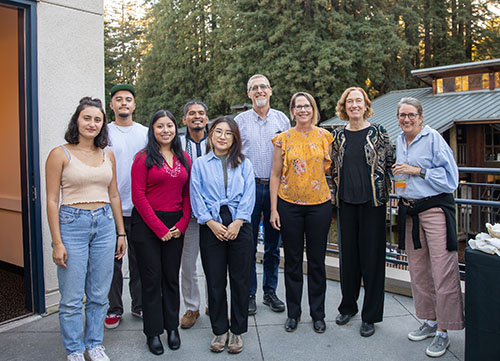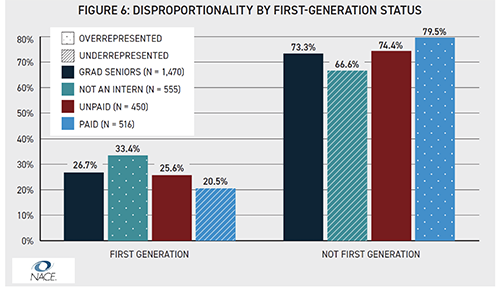In her last year at UCSC, Yoselyne Cerros (Oakes ’22, Latin American & Latino studies, politics, legal studies minor) aspired to attend law school but was apprehensive because she lacked formal experience in the legal field. But after being awarded a scholarship through Transforming Futures—a pilot scholarship program launched by UC Santa Cruz’s Institute for Social Transformation in Summer 2022—Cerros spent her summer interning with the Watsonville Law Center (WLC), and is now confident in pursuing her goal to become a first generation attorney.
“I’m very grateful for the Transforming Futures program and the opportunity it gave me,” Cerros said. “This program has genuinely impacted my experience at UCSC and given me the experience that I felt I was lacking to continue pursuing my career goals. I enjoy the work I’ve been doing and I know I’ll be able to excel in grad school.”
Transforming Futures’s mission is to open up opportunities and remove financial barriers for first-generation, underrepresented, and/or low-income college students at UC Santa Cruz so they can participate in career-advancing summer internships. Seven UCSC students were awarded up to $6,000 in Transforming Futures Scholarships. These students pursued internships at local non-profit organizations, California government, and an Oakland-based non-profit.
At the WLC, Cerros worked on research assignments, helped create outreach material, completed the entire process of a u-visa application, and more. At the end of her internship, she was offered a part-time legal-assistant position at WLC.
“I’m usually hesitant to apply for scholarships because they tend to reach a more general audience,” Cerros said. “But once I saw that this scholarship was intended for people like me, I knew I needed to apply.”
Nationally, unpaid internships disproportionately affect first-generation, underrepresented, and low-income college students.
According to data from the National Association of Colleges and Employers 2021 Student Survey, 74 percent of white students said they’d had unpaid internships and 73 percent had paid internships, compared to 8 percent and 6.6 percent, respectively, for Black students and 10.2 percent and 7 percent for Hispanic or Latinx students.
Among first-generation students, 25.6 percent reported they were unpaid interns, and 20.5 percent were paid.
“This is the first program of its kind on the UC Santa Cruz campus, and there's clearly a demand for it,” Faculty Director Chris Benner said. “The ultimate goals of Transforming Futures are to help launch UCSC students from underrepresented backgrounds into successful careers. And so, giving them that work experience and social connections that they wouldn't have access to otherwise hopefully will help launch them.”
Benner and Institute Transformation Director Evin Knight spearheaded the debut of Transforming Futures, with the invaluable support of the Experiential Learning Team of campus’s Career Success department, who helped in designing the program and preparing the students to benefit the most from their internship experience. Dean of Social Sciences Katharyne Mitchell emphasized the importance of offering a program like Transforming Futures at UCSC.
“I'm truly thrilled that we can provide this type of experience for our students,” Dean Mitchell said. “Transforming Futures does just that: it is one of those rare programs that can change student lives in constructive and meaningful ways for the long term. I'm so grateful to our donors for their support and imagination, and to Chris Benner, Evin Knight, and all of the other staff at the Institute for Social Transformation for making this initiative possible.”
All funds for the Transforming Future Program were made available to students through the generosity and invaluable support of MR Macgill and Ho Nam, who were attracted to the campus because of its reputation for supporting first generation college students.
“It is clear that internships provide an important experiential learning opportunity for students to gain professional experience, build professional networks, create future career pathways, and are an important component of student success,” MR said. “But unfortunately, a number of meaningful internships are unpaid, particularly at non-profit or government organizations, and therefore are not an option for many students with limited financial resources.”
Looking for an institution where they could give back to the community, MR and Ho interviewed high school principals of schools throughout the Bay Area and asked them where their first-generation students were attending college. The top recommendation amongst those interviewed was UC Santa Cruz.
“So much usually gets overlooked, but Transforming Futures addresses a number of critical issues,” MR said. “The program will teach these students skills that universities don’t always address.”
Third-year politics student Amanda Safi (John R. Lewis ’24, politics) spent her summer interning for the House of Representatives at the Office of Congressman Jimmy Panetta. An experience she says enhanced her educational experience at UCSC, and allowed her to explore a career path she hadn’t been able to before. Without a scholarship from Transforming Futures, Safi wouldn’t have been able to pursue the unpaid internship and stay in Santa Cruz.
“Receiving this scholarship helped in relieving the extra stress and pressure from needing to juggle multiple responsibilities at once,” Safi said. “I’ve heard a lot of people say that the heart of what you learn about in your career is done through outside experience and interactions in the real world, rather than solely in the classroom. I think that that was definitely the case for me in this internship which has elevated my understanding of what I’ve already learned in class.”
Program director Chris Benner said that he is hopeful Transforming Futures will continue to offer life-changing experiences to UC Santa Cruz students in the coming years.




